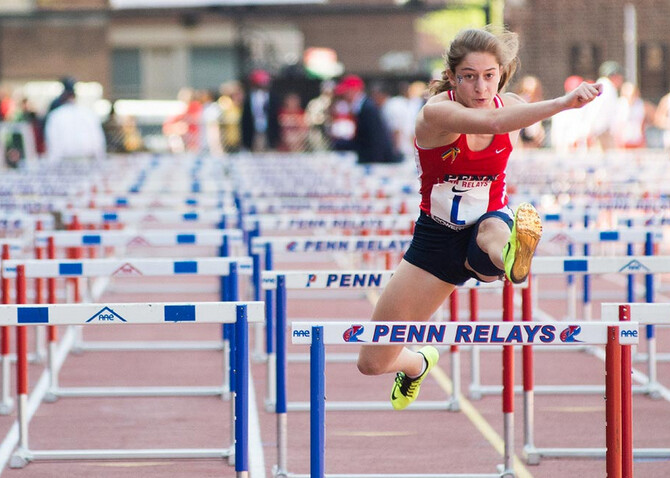Student-Athlete at Penn Soars Over Life’s Biggest Hurdles
Eliana Yankelev doesn’t let life’s biggest obstacles get in her way.
A member of the track and field team at the University of Pennsylvania, the 20-year-old sophomore competes in sprints, hurdles and the long jump.
Not so long ago, she was a student-athlete at Lower Merion High School. Back then, Yankelev knew that she had a major hurdle ahead: coming out as gay.
Like any college-bound student, she did her research on which colleges suited her best. But Penn’s reputation for being a gay-friendly campus stood out to her.
“Even before I applied to Penn, I researched a few of the groups, like the Lambda Alliance, and found that there was even a niche organization for gay athletes like me,” Yankeley says.
Known as PATH, the Penn Athletes and Allies Tackling Homophobia, it addresses the mutual concerns of Penn’s LGBT and athletic communities and encourages communication between the two groups in order to create a safe environment. Yankelev, who is the group’s executive chair, and its other members provide resources for student-athletes who wish to come out and also furnish information about LGBT-related issues for heterosexual coaches and athletes.
The summer before her freshman year at Penn, she heard from a fellow incoming student about a photographer, Jeff Sheng, and his “Fearless” project, featuring portraits of high school and collegiate LGBT athletes. Yankelev heard that he was still looking for athletes to add to the compilation and contacted him.
“I was extremely lucky that he was in town and willing to photograph me at such short notice. At the time of the shoot, I never expected that it would have such an impact on my personal life and advocacy work,” she says. “It was definitely easier to come out’that way, although sometimes I feel that it was too ambiguous of an action.”
Out of approximately 1,000 athletes on campus, Yankelev is one of fewer than a dozen who have publicly come out.
Yankelev regularly attends events sponsored by J-Bagel, which is Penn’s Jewish LGBT organization. She also serves as the representative for women’s track and field on the Student Athlete Advising Committee.
In addition to representing gay athletes at Penn, Yankelev is a collegiate ambassador for Go! Athletes, a national non-profit organization dedicated to educating, engaging and empowering every generation of LGBT athletes and allies. She also created the Ivy League network for LGBT athletes.
She credits her friends for being there to support her during what can be an intense, painful, fearful, confusing, yet liberating time as a part of a lifelong process of finding self-acceptance.
Yankelev says that coming out to her friends was the easy part. But, sharing with her family was, and still is, a difficult and ongoing process.
“A lot of nerves, tension and doubt preceded my coming out to my family,” she explains. “It was a huge weight off my chest, but it still created a lot of tension with certain family members.”
For the most part, though, she feels free to openly discuss her life and relationships.
Her next major hurdle was to learn how to understand abhorrence and loathing.
Growing in up Wynnewood, Pa., Yankelev always knew that she wanted to look at the origins and science of hatred.
Her personal story inspired her to pursue an academic path that might allow her to make some big strides toward her own healing.
Through her major, the biological basis of behavior in the College of Arts and Sciences, Yankelev hopes to gain a clearer understanding of her life by tracing back the chain of events that might explain her father’s decision-making process and actions.
Growing up in Soviet Lithuania as the oldest son of Holocaust survivors, her father’s tumultuous upbringing involved two hurried immigrations, first to Poland and then to Israel. In his mid-20s, he came to the United States to study at the Juilliard School.
Learning of her family’s history, she could see how the environment he grew up in affected him as a person and how it made a substantial impact on the way he interacted with his wife and children.
When Yankelev was in fourth grade, her father left.
“What I want to study is the inheritance of addiction and the effects of substance abuse on behavior and relationships -– and whether or not a behavior that is learned, based on systematic oppression, can be passed on,” says Yankelev.
Yankelev credits Penn’s interdisciplinary and research opportunities for undergraduates as another key factor in decision to come to the University.
“I loved how the academic programs were so strong, that, if I decided to change the direction of my studies, I couldn’t go wrong,” she says.
“I fell in love with the campus and the atmosphere when I visited. I just saw myself as a student here,” Yankelev explains. “I feel like Penn has a lot of answers for me.”








